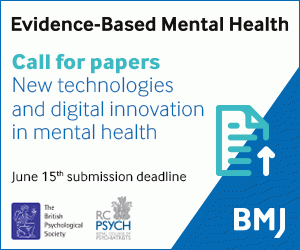
In partnership with NIHR MindTech Healthcare Technology Co-operative and The Mental Elf.
We are delighted to announce a Special Issue of the Evidence Based Mental Health journal on New Technologies and Digital Innovation in Mental Health.
Guest Editors: Lisa Marzano, London; Chris Hollis, Nottingham; Gin Malhi, Sydney.
Deadline for submissions:
15 June 2017
Publication date:
November 2017
Special issue aims and scope
We are delighted to announce that Evidence-Based Mental Health will be publishing a special issue on new technologies and digital innovation in mental health. It will be guest edited by Lisa Marzano (London), Chris Hollis (Nottingham) and Gin Mahli (Sydney), in partnership with NIHR MindTech and The Mental Elf.
With increasing interest and investment in digitally-enabled mental health research and clinical practice, this issue aims to bring together the latest research and thinking in this new and exciting field. Original articles, including quantitative or qualitative studies, clinical or systematic reviews, are welcome.

Potential topics
Potential topics include, but are by no means limited to:
- (Co)designing and implementing technological innovations in mental healthcare (including implementation and adoption studies in relation to ‘mhealth’, ‘e-health’, ‘digital mental health’, ‘apps’, and ‘internet interventions’)
- The digital divide and capacity building in mental healthcare
- Evaluating digital mental health interventions: methodological issues and approaches
- User experience and mental health provider views about digital health innovations
- Clinical effectiveness and cost-effectiveness of digital innovations in mental healthcare
- Wearable sensors and remote monitoring technologies in mental health research and clinical practice
- Online, messaging and app-based psychological interventions (including evidence of safety, acceptability, clinical and cost-effectiveness)
- Virtual reality, avatar therapy and artificial intelligence in mental health and crisis care
- Informatics, ‘big data’ and predictive analytics in mental health research (including research focusing on electronic records, algorithms and computerised clinical decision support tools)
- Personalised and precision digital mental healthcare
A new collaboration: creating new impact and platforms of dissemination for new research
We are very excited about this upcoming special issue. It will showcase new research in this increasingly important field and will also bring together EBMH with NIHR MindTech and the Mental Elf:
- EBMH is a widely accessed and key resource for psychiatrists and psychologists aiming to base their practice on up-to-date research evidence;
- NIHR MindTech is a world-leading centre focussing on the development, adoption and evaluation of new technologies for mental healthcare and dementia; and
- The Mental Elf network now counts over 44,000 Twitter followers, 1 million unique website visits in 2016 and over 180 blog contributors.

The Mental Elf will help disseminate the new EBMH digital mental health research in blogs, podcasts and across social media.
Further information
The Editors of this issue would be happy to discuss ideas for articles in advance of their receipt. All manuscripts will be peer reviewed and up to 6 contributions will be published. Three of them will be free access (no charge for the authors and available to anyone).
Information on article types and instructions for authors: Original articles and Clinical reviews.
For any additional information, please contact Lisa Marzano (EBMH Section Editor, L.Marzano@mdx.ac.uk) or submit directly to EBMH via ScholarOne.
More information about Evidence-Based Mental Health is available on the journal’s homepage: http://ebmh.bmj.com/

This type of research focuses on treating ill people with new technology – this is a neoliberal agenda, so there is less focus on building relationships and understanding and no at tempt to look at psychosocial research or psychoanalytical work. Thus the technology becomes a substitute for building understanding relationships. And you yet relationships are one of the most effective ways of promoting mental health.
I am reading a book on critical educational psychology, so I am sensitive to the way we objectify mental health and disability. If we are going to work alongside psychiatrists and psychologist, let us be critical friends
Nigel a GP